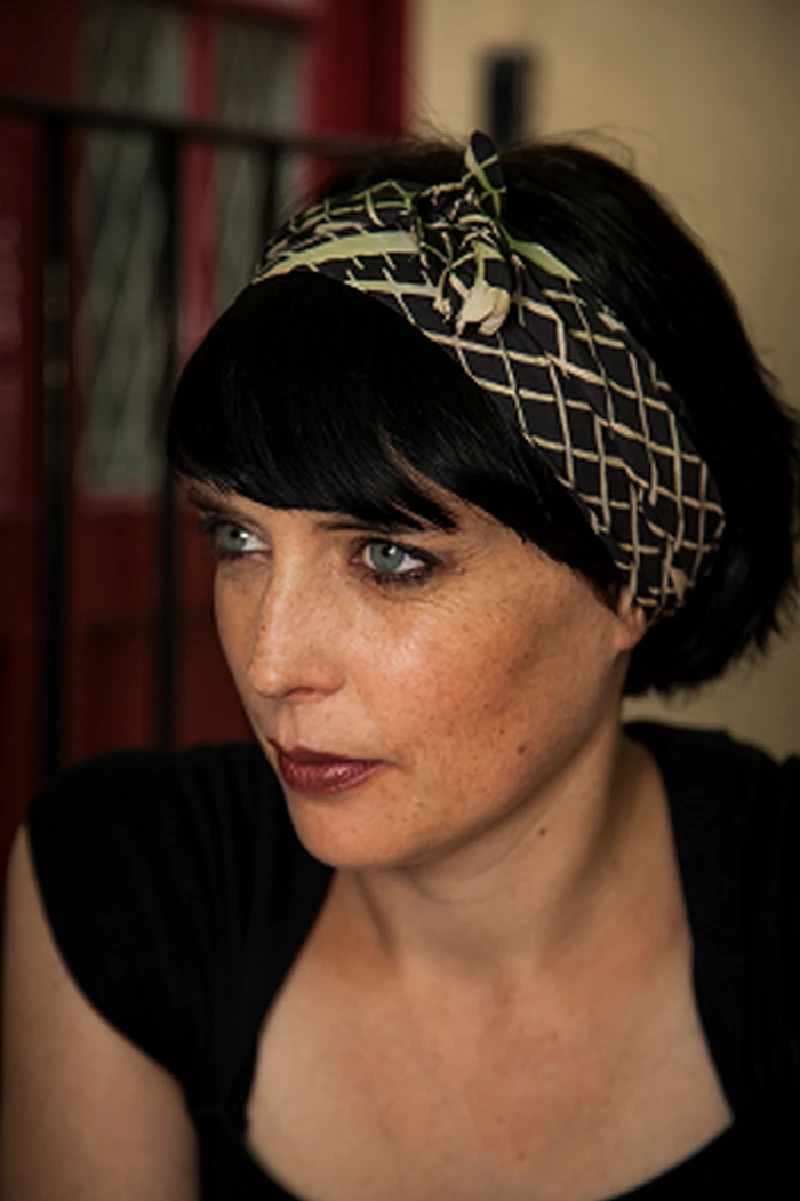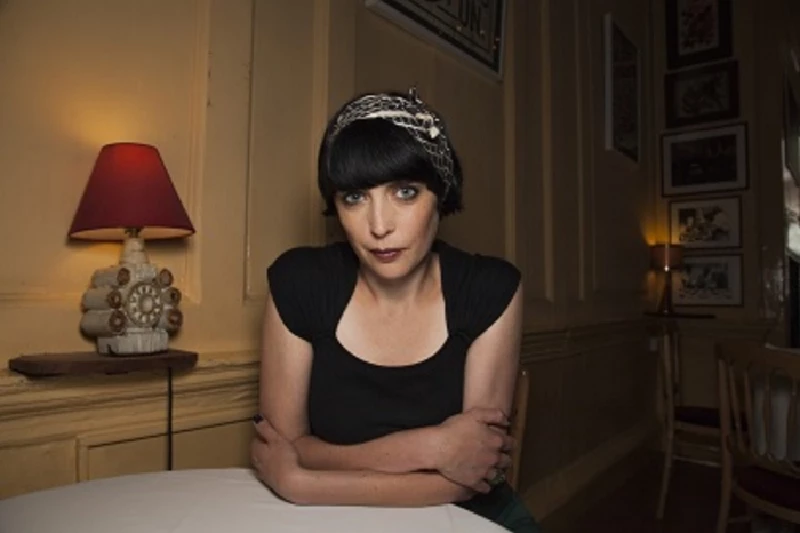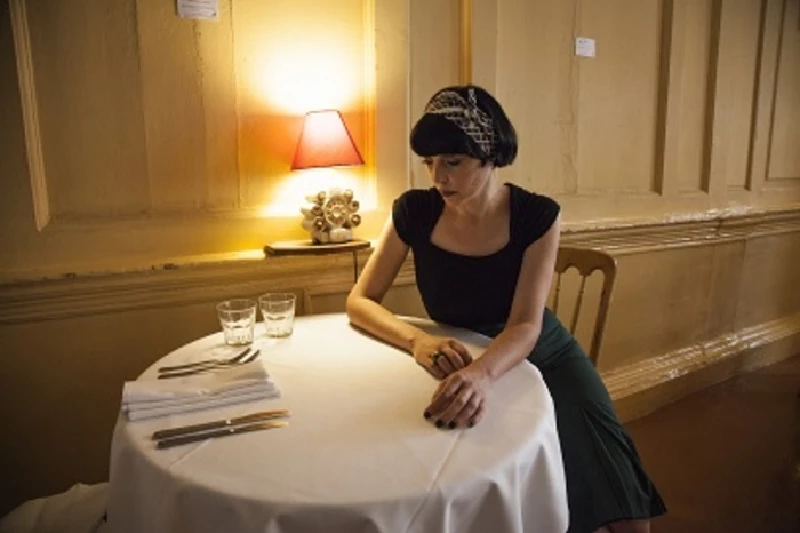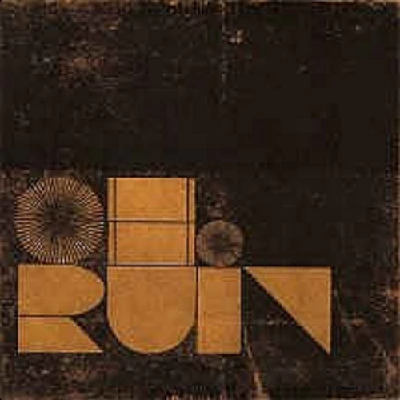Oh Ruin - Interview
by Lisa Torem
published: 14 / 12 / 2013

intro
Lisa Torem speaks to Piano Magic member and French-born pianist and composer Angele David-Guillou about her debut album under her own name, 'Kourouma'
French-born Angele David-Guillou, who now resides in London, was known as Klima when she recorded several acoustic pop albums, with her crystal clear voice at the helm, but for her new album ‘Kourouma’ it seemed natural to reclaim her given name. After all, she is the first to admit that the writing of these lithe piano compositions was a deeply personal experience. Her years of grounding in piano study are very obvious - the compositions are strong in structure, but delicate in touch. She sometimes recalls Chopin or Satie, and at other times Bartok, Nyro or Tori Amos. Though the pieces are centred around the elegant sound of the grand piano, tasteful touches of bells and elegant strings add sublime colour. Each piece is unique and yet, collectively, there is a universal thread that they share: David-Guillou is a great admirer of traditional music from France, Latin America and Africa. Her work is peppered with the random odd scale, irregular rhythm or sudden change in harmony that makes such music irresistible. Yet, her fascination with artists like Muddy Waters, Bach, Orff, Moondog and Sonic Youth must drive her to blend the old and the new. As a recording artist/performer, David-Gillos appears eager to experiment and evolve. With Piano Magic, an ensemble of rotating artists based around Second Language label owner Glen Johnson, she contributed as a writer and vocalist. On ‘Kourouma’ she commits herself to original melodies and a slo-mo improvisational feel – this is a far cry from the ballads and electronic recordings of the past, yet when she occasionally sings on ‘Kourouma’, her voice rarely rises above a whisper, yet still evokes emotion. This careful juxtaposition of voice and piano is only one element of her new project that makes it outstanding; the backstory is another. Angele, talking to Pennyblackmusic, disclosed how romantic Parisian Rues, the Russian language, surrealism and the Arab Spring influenced the making of ‘Kourouma’, PB: How has your early musical training and education influenced your current work? ADG: I studied piano and music theory in a music school from the age of five to fifteen. This had a very big influence on me, in more than one way. Obviously it taught me some piano skills but also I got to listen to and analyse a lot of classical music, which is certainly why it is still a huge part of my musical tastes today, especially Baroque music. Also this formal education made me rebel against it, made me want to do my own thing even more, because it was very elitist (totally antipop music typically) and aimed at forming interpreters rather than composers, which I could never quite understand. This certainly pushed me into teaching myself guitar when I was 12 and then joining a noise band when I was 15. In many ways this piano album I’ve just released came from a long-lasting will to merge those two sides of my musical culture. PB: When using the moniker, Klima, on 'Serenades and Serinettes', your work was collaborative, vocal and inclusive of electronic/ambient ideas, whilst on 'Kourouma' you use piano as your central instrument with the additional instruments working in tandem. How has this change impacted your choice of themes and colour? ADG: The main thing was that I wanted to write music that was very honest and without artifice, and probably this has created a different palette of emotions and colours, as you say. But in fact, it’s probably what I’ve always wanted to do with Klima albums and some songs from my previous records are like this, I think: ‘Father’ on ‘Serenades and Serinettes’ or ‘The Damage is Done’ on my first album, for instance. But somehow with Klima I always got sidetracked or overexcited by the possibilities of adding arrangements, mixing electronic with strings, etc. Maybe I needed to prove to myself that I could do music with a lot more layers and production, so that then I could start something much more essential and straight to the point. I bought a piano four years ago, and as soon as I got playing again it became obvious that this would be the perfect medium to carry that project through. The piano has this magical quality that it is both extremely minimalist and at the same time very versatile with an incredible richness of tones and emotions. PB: Do you see yourself composing ballads like 'French Mittens' in the future? ADG: Oh, I would love to write ballads like ‘French Mittens’, any time. It’s actually a cover of a Piano Magic song, which I’ve always loved but thought was too short and could give more. The original version is based around a sample of a string ensemble played backward. And somehow I decided that I should try to score that backward sample and have it played by musicians. It was a lot of fun. I will make another Klima album, based around songs. That’s for sure. I’m not certain when it will be released, but it will happen. PB: On 'Kourouma' are you influenced by landscapes? Was 'Anti Atlas' actually inspired by the vivid blue hues and the dramatic valleys of the Moroccan Anti Atlas mountains? ADG: I was writing some of the songs on the album at the time of the Arab Spring, and all that happened afterwards and is still happening today in Libya and Syria; moments of incredible hope and sadness at the same time. These are very beautiful countries with extraordinary cultural and musical heritages, and they’re being wounded. I listen to a lot of North African and Middle-Eastern music myself, and I’ve been very affected by these events. So, yes, I wanted these influences to be present, not just in the music, but in the titles of the song, it was my way of giving homage, I guess. The song ‘Anti Atlas’ is based around a succession of minor and major chords, and I just thought the words described the music perfectly. It is quite an arid song too; it just clicked. There’s also a song called ‘Ubari Sand Sea’ which refers to a beautiful desert in Libya. PB: The song 'Kourouma' sounds like one, which you might hear if you opened up a little Russian jewelry box. Was this fragile melody inspired by old Eastern European folk music? ADG: I studied Russian at school and I love the language and the music. It’s terribly un-cool but I’m a big fan of the Russian Army Choir record,s for instance. The traditional nationalistic songs are just absolutely stunning and so moving, this strange mix of strong manly interpretation and deep emotions. To me, the sound of the Russian language itself has this interesting duality. Strangely the tune to‘Kourouma’ came to me after I read a very sad book by the Ivorian writer Ahmadou Kourouma, not quite Eastern European then. But I guess it triggered some similar feelings of both power and fragility, the idea of resistance too, of expressing hope in moments of sorrow. I suppose that is why it came out this way. PB: 'And The Grass Was Singing' sounds like a dialogue between piano and strings in which the piano asks the deep, thoughtful query and the strings answer rather abruptly. The title also references a novel by Doris Lessing about racial politics in 1940’s Zimbabwe. Is there some kind of connection? ADG: That’s a wonderful analysis. I’m not certain I thought about it so rationally, but there’s probably some truth there. There is a dialogue in the music, which is intended. I’m not really interested in string arrangements that are in the background to fill a gap or add a bit of extra emotions. I did want each part to be meaningful. There is little singing on the album, but to me each piano or violin line is a voice in itself; it tells a story. ‘The Grass is Singing’ by Doris Lessing is a beautiful book which to me deals mainly about the discrepancy between the love for a landscape, a soil and the complex events that happen on it. Maybe the piano is the landscape and the violin represents the fucked up world of the people who inhabit it. It’s possible. PB: 'Dream of Leonor Fini' references an acclaimed surrealist painter. How did you approach translating those visual images to sonics? Which of Fini's works captivated you the most? ADG: I grew up with a couple of Fini’s paintings (reproductions sadly) in my parents’ house. The one that most impressed me is that of two naked women on a train. I’m not certain what the title is. It’s an amazingly colourful painting, dreamlike in its contrasts and the shapes of the women it depicts especially. I was always fascinated by it. There’s a sort of fluidity in the lines of the bodies, in their movement; it’s very magical. I think I started writing the piece for the piano originally, then played it on the Wurlitzer and thought it worked very well. And this is when the sound of the Wurlitzer got me thinking of Fini’s painting, I think. From then on I tried to elaborate more on the surreal quality of the world she painted PB: 'Hesperides' has such an intense feeling of movement, with 'Contrescarpe II' coming in at a close second. Did you write these pieces with imagery in mind? ADG: ‘Contrescarpe II’, to me is a walk in Paris at night. I used to live right at the bottom of the Rue Mouffetard in the 5tharrondissement, and this steep street culminates on the Place de la Contrescarpe. This is what I had in mind when I wrote the piece. ‘Hesperides’ is more of a muddle of feelings really, the joyfulness of being discombobulated. PB: 'Our Garden' is one of just a few songs where we hear you vocalize. What are you reciting? ADG: The lyrics are: “At the end of it all, one has to live amidst the madness of men/And if this little can be done, let us cultivate our garden.” Voltaire’s book ‘Candide’ ends with the line, ‘let us cultivate our garden’ (I’m not sure about the English translation here), which refers to the fact that the world is mad and complicated and that, unfortunately, one person cannot change it all. But at least we can choose to be happy under our own terms, and look after ourselves and the ones we love. It’s a strange book, but I always thought the conclusion was spot on. PB: Which traditional rules of composition work best and which do you find limiting? Do you see yourself as conservative or a rule-breaker? ADG: Oh, I don’t really have any rules of compositions; I’m not that clever, unfortunately. I’m not thinking about following sets of laws or breaking the rules either, I just want to do what I like and find my own way. Let’s see where it takes me. PB: Imagine you're a journalist who could go back in time to ask one composer one question. What would it be? ADG: I would ask Carl Orff and Gunild Keetman to talk about the influence of African music on their music writing. PB: Thank you.
Picture Gallery:-


reviews |
|
The Pillow Where Your Head Does Lay (2010) |

|
| Epic and romantic debut vinyl only single from Oh Ruin, the project of crooning Irish singer Eoin O'Ruinaigh |
most viewed articles
current edition
Spear Of Destiny - InterviewRobert Forster - Interview
Fiona Hutchings - Interview
When Rivers Meet - Waterfront, Norwich, 29/5/2025
Carl Ewens - David Bowie 1964 to 1982 On Track: Every Album, Every Song
Chris Wade - Interview
Brian Wilson - Ten Songs That Made Me Love...
Shrag - Huw Stephens Session 08.12.10 and Marc Riley Session 21.03.12
Pistol Daisys - Waterfront, Norwich, 29/5/2025
Credits - ARC, Liverpool, 17/5.2025
previous editions
Heavenly - P.U.N.K. Girl EPBoomtown Rats - Ten Songs That Made Me Love....
Barrie Barlow - Interview
Oasis - Oasis, Earl's Court, London, 1995
Manic Street Preachers - (Gig of a Lifetime) Millennium Stadium, Cardiff, December 1999
Dwina Gibb - Interview
Chuck Prophet - Ten Songs That Made Me Love...
Pixies - Ten Songs That Made Me Love...
David Paton - Magic: The David Paton Story
Sound - Interview with Bi Marshall Part 1
most viewed reviews
current edition
Peter Doolan - I Am a Tree Rooted to the Spot and a Snake Moves Around Me,in a CircleGarbage - Let All That We Imagine Be The Light
Vinny Peculiar - Things Too Long Left Unsaid
Little Simz - Lotus
John McKay - Sixes and #Sevens
Suzanne Vega - Flying With Angels
HAIM - I Quit
Morcheeba - Escape The Chaos
Vultures - Liz Kershaw Session 16.06.88
Billy Nomates - Metalhorse
Pennyblackmusic Regular Contributors
Adrian Janes
Amanda J. Window
Andrew Twambley
Anthony Dhanendran
Benjamin Howarth
Cila Warncke
Daniel Cressey
Darren Aston
Dastardly
Dave Goodwin
Denzil Watson
Dominic B. Simpson
Eoghan Lyng
Fiona Hutchings
Harry Sherriff
Helen Tipping
Jamie Rowland
John Clarkson
Julie Cruickshank
Kimberly Bright
Lisa Torem
Maarten Schiethart